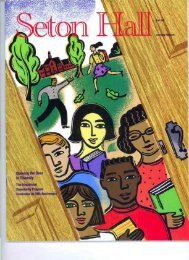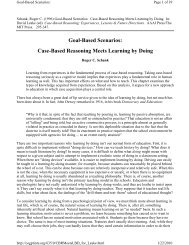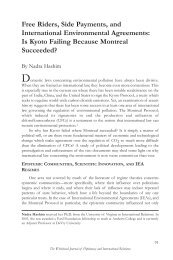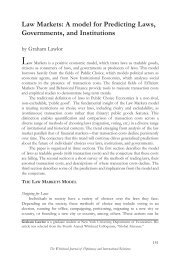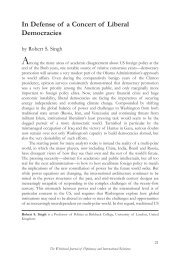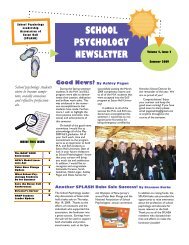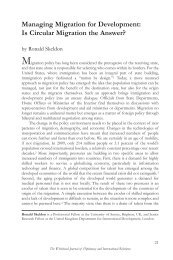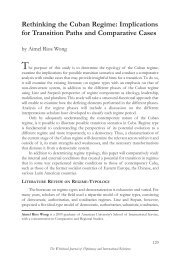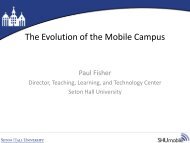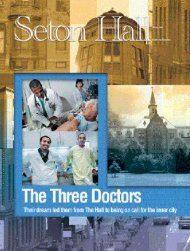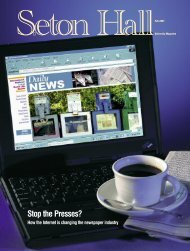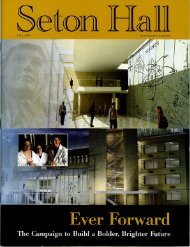Seton Hall Magazine, Winter 2003 - Seton Hall University
Seton Hall Magazine, Winter 2003 - Seton Hall University
Seton Hall Magazine, Winter 2003 - Seton Hall University
You also want an ePaper? Increase the reach of your titles
YUMPU automatically turns print PDFs into web optimized ePapers that Google loves.
Reverend Christina Hindley, J.D. ’84, M.Div. has found her<br />
calling in life: serving as chaplain and director of<br />
pastoral care at White Plains Hospital Center<br />
in New York State. But the road she traveled to<br />
become a spiritual leader in the healthcare field<br />
was anything but direct.<br />
Growing up in Mercer County, she<br />
attended Trenton State College (now<br />
The College of New Jersey), where she<br />
majored in music education. As a studentteacher<br />
in the early 1970s, she learned<br />
that she especially enjoyed working<br />
with adults — a revelation that led<br />
her upon graduation to forgo teaching<br />
music and instead enter the<br />
business world, first in banking<br />
and later as a paralegal.<br />
While working at the<br />
law firm of Destribats &<br />
Hamilton in Hamilton,<br />
New Jersey, she came into<br />
contact with several <strong>Seton</strong><br />
<strong>Hall</strong> <strong>University</strong> alumni —<br />
Jay Destribats, J.D. ’64,<br />
Richard Hamilton, J.D. ’74,<br />
Anthony Massi ’75/J.D. ’78<br />
and Michael Paglione, J.D.<br />
’78. “These colleagues<br />
encouraged me to go back to school for my<br />
law degree,” she says. “And they spoke so<br />
highly about <strong>Seton</strong> <strong>Hall</strong>’s law school.” So, she<br />
started making the trek to Newark for classes,<br />
not knowing that the law school experience<br />
would significantly change her life.<br />
“While I always considered myself to be a<br />
critical thinker, I often viewed the world in<br />
terms of black and white, right or wrong,<br />
good or evil,” Reverend Hindley explains. “ I quickly learned that<br />
no issue can be resolved that simply. The Law School courses<br />
opened my eyes to unending shades of gray, teaching me to argue<br />
both sides of an issue. Issues in law, just like issues in life, are not<br />
black and white. Critical thinking requires effort, humility and<br />
genuine care for others. <strong>Seton</strong> <strong>Hall</strong> School of Law elicited those<br />
qualities, challenged my world view and changed my life.”<br />
While her critical thinking skills were being challenged in the<br />
classroom at night, she was putting her education to good use<br />
during the day. She worked for the New Jersey Economic<br />
Development Authority (NJEDA), which provides loans and<br />
issues tax-exempt bonds to help the state’s companies start or<br />
expand businesses. She monitored whether the companies created<br />
jobs and did what they promised to do with these public funds.<br />
32 SETON HALL UNIVERSITY MAGAZINE<br />
Her Calling to Healthcare Ministry Began in Law and Music<br />
At the <strong>Seton</strong> <strong>Hall</strong> <strong>University</strong> School of Law, where she earned her law degree<br />
before becoming a minister, Reverend Christina Hindley, J.D. ’84, M.Div. found<br />
that a focus on ethics and accountability resonated throughout the curriculum.<br />
“I try to help people find<br />
answers to their questions<br />
about life, death, suffering<br />
and hope without imposing<br />
my beliefs on them.”<br />
“I remember being affected at <strong>Seton</strong> <strong>Hall</strong> by the Professional<br />
Responsibility and Ethics class,” Reverend Hindley<br />
says. “The essence of this course — the need to<br />
be vigilant in our efforts to behave ethically and<br />
to be accountable — resonates throughout<br />
the Law School curriculum, and applies not<br />
only to the legal profession but to the<br />
corporate world and religious life as well.”<br />
After graduating with a law degree in<br />
1984, she continued working for the<br />
NJEDA and launched a part-time, private<br />
law practice, specializing in estate<br />
settlements, wills and living wills.<br />
Looking back, she realizes that while<br />
meeting with clients whose loved<br />
ones had died, and listening to<br />
their family stories, she was<br />
facilitating their grief process.<br />
In 1989, Hindley turned<br />
39, the same age her mother<br />
was when she died. The<br />
attorney found herself doing<br />
some serious soul search-<br />
ing. “I was happy with<br />
my life,” she says, “but I felt<br />
that there was something else<br />
I was supposed to do.”<br />
In 1991, while in Atlanta<br />
for a conference, she spent a week at a<br />
Christian commune that ministers to the<br />
homeless. She later attended an open house<br />
at the Columbia Theological Seminary. At<br />
the end of her two-week stay in Atlanta, she<br />
was ready to enroll at the Presbyterian seminary.<br />
She says, “The education I received<br />
continued the education in ethics that I<br />
received at <strong>Seton</strong> <strong>Hall</strong>,” she says. “My<br />
world view and belief system were challenged once again. It was<br />
here that I learned how God is at work in the world and the part<br />
I was called to play in that work.”<br />
Her eyes were opened on many fronts at Columbia Theological<br />
Seminary. She calls a hospital visitation course a “redemptive<br />
experience,” for it made her realize, she recalls, how she could<br />
“bring all my life experience to ministry and help people find<br />
strength and cope with their illnesses.”<br />
Following graduation, Reverend Hindley completed a one-year<br />
residency with the Tri-Hospital Clinical Pastoral Education Center<br />
in Atlanta to prepare for a chaplaincy. That year, she suffered the<br />
loss of her seminary prayer partner, Vanessa Knight, to ovarian cancer.<br />
“I participated in her ordination in July 1995 and in her funeral<br />
just one month later,” she says quietly. “The focus of my seminary



